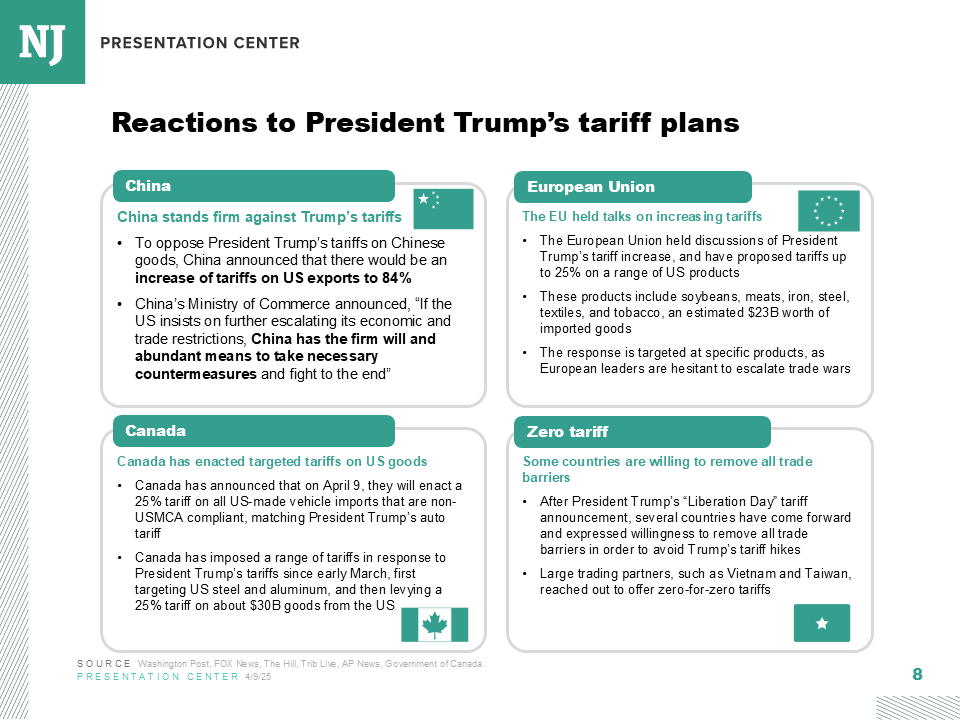Meta and Apple on Wednesday became the first two companies fined for violating the EU’s new Digital Markets Act, potentially escalating the ongoing trade war between the U.S. and the European Union.
Under the law, the European Commission fined Apple $570 million, while Meta, the parent company of Facebook, WhatsApp, Instagram, and others, was fined roughly $227 million. The law aims to keep the largest tech companies, referred to as gatekeepers, from using their dominant economic position to squash competition and harm users.
But the White House has repeatedly pointed to the law as a form of “economic extortion” meant to harm American companies, suggesting it might be countered by imposing additional tariffs on European imports. In early April, President Trump announced a massive round of global tariffs, allegedly to help counter trade barriers like the DMA, but he quickly reversed them after global markets started a serious decline.
The threat of European fines for violations of the DMA pre-date Trump’s current term in office.
The law was first enacted in 2022, but companies had until March 2024 to comply. After it took effect, the European Commission launched investigations into both Apple and Meta, and the fines were the long expected result of those investigations.
Apple’s app store came under fire from the European Commission for blocking app developers using the store from directing customers to alternative and cheaper ways to download apps or make purchases, according to a press release announcing the fines.
Apple generally takes a commission from sales that originate on its app store or through apps downloaded by the store. It has historically tried to limit companies from pushing their customers to alternative points of sale that don’t trigger commissions. In addition to the fine, Apple will have to remove whatever barriers it has in place that prevent app developers from pushing customers to alternative points of sale.
It was not all bad news for Apple, however. The commission found that Apple, in compliance with the DMA, had made it easier to uninstall apps on the iPhone, and dropped its investigation into that potential violation.
For Meta, the European Commission found the company had failed to comply with the DMA's requirement that companies allow users to opt out of having their personal data combined between different services.
“It did not give users the required specific choice to opt for a service that uses less of their personal data but is otherwise equivalent to the ‘personalised ads' service,” the press release said. “Meta's model also did not allow users to exercise their right to freely consent to the combination of their personal data.”
In November, Meta launched a new option in an attempt to comply with the law, but that is still under investigation.
“Enabling free business and consumer choice is at the core of the rules laid down in the Digital Markets Act. This includes ensuring that citizens have full control over when and how their data is used online, and businesses can freely communicate with their own customers,” Henna Virkkunen, the EU’s executive vice president for Tech Sovereignty, Security, and Democracy, said in a press release. “The decisions adopted today find that both Apple and Meta have taken away this free choice from their users and are required to change their behaviour.”
While EU officials have maintained that these fines have nothing to do with the ongoing trade tensions between the U.S. and Europe, the White House seems poised to retaliate.
A White House memo from February said that Trump would consider launching tariffs against any nation that levies fines on American companies.
In early April, Trump announced that EU imports would face a 20 percent tariff for most of its products sold in America. While some tech exports like semiconductor chips were exempted, Trump said he would announce tariffs on them in the near future.
Shortly after that announcement, the global stock market started to slide and Trump reduced the so-called retaliatory tariffs to just 10 percent. And he has talked about leveraging those tariffs for new trade deals. But the new fines may cause the White House to change course yet again.
“The European Union has fined Meta and Apple—two major American tech companies—hundreds of millions of euros under their discriminatory Digital Markets Act," Brian Hughes, the White House’s national security spokesman, told National Journal in an emailed statement on Wednesday. "This novel form of economic extortion will not be tolerated by the United States. The EU’s malicious targeting of American companies and consumers must stop.”
Hughes stopped short of calling for specific retaliatory measures against the EU, and the commission's relatively small fines against the American tech giants may help ease some of the White House’s ire.
According to the DMA, the European Commission could have fined Apple and Meta for up to 10 percent of their global annual revenue, but the actual fines were closer to 0.1 percent. European officials maintained that the fines were relatively low because this is the first offense of a relatively new law that both companies had made moves to comply with, and not because they hope to avoid new tariffs.
“Today’s decisions send a strong and clear message," Teresa Ribera, the EU’s executive vice-president for Clean, Just, and Competitive Transition, said in the press release. "The Digital Markets Act is a crucial instrument to unlock potential, choice and growth by ensuring digital players can operate in contestable and fair markets.”










